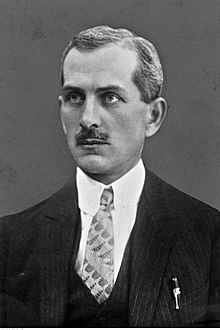Florian Znaniecki | |
|---|---|
 | |
| Born | 15 January 1882 |
| Died | 23 March 1958 (aged 76) |
| Nationality | Polish, American |
| Alma mater | Jagiellonian University (Kraków) |
| Known for | Contributions to logology[1] The Polish Peasant in Europe and America humanistic coefficient culturalism |
| Children | Helena Znaniecki Lopata |
| Scientific career | |
| Fields | Sociology |
| Institutions | Adam Mickiewicz University (Poznań), Columbia University, University of Illinois at Urbana-Champaign |
Florian Witold Znaniecki (15 January 1882 – 23 March 1958) was a Polish and American philosopher and sociologist who taught and wrote in Poland and in the United States. Over the course of his work, he shifted his focus from philosophy to sociology. He remains a major figure in the history of Polish and American sociology; the founder of Polish academic sociology, and of an entire school of thought in sociology.[2]
He won international renown as co-author, with William I. Thomas, of the study, The Polish Peasant in Europe and America (1918–1920), which is considered the foundation of modern empirical sociology. He also made major contributions to sociological theory, introducing terms such as "humanistic coefficient" and "culturalism".
In Poland, he established the first Polish department of sociology at Adam Mickiewicz University, where he worked from 1920 to 1939.
His career in the US began at the University of Chicago (1917 to 1919) and continued at Columbia University (1932 to 1934 and 1939 to 1940) and at the University of Illinois at Urbana-Champaign (1942 to 1950).
He was the 44th President of the American Sociological Association (for the year 1954).
- ^ Michał Kokowski, The Science of Science (naukoznawstwo) in Poland: Defending and Removing the Past in the Cold War. As chapter 7 in: Science Studies during the Cold War and Beyond. Paradigms Defected. Edited by Elena Aronova, Simone Turchetti. Palgrave Macmillan, 2016. “Palgrave Studies in the History of Science and Technology”, pp. 149–176. DOI: 10.1057/978-1-137-55943-2_7; here p. 149: "some Polish contributors to science of science (Kazimierz Twardowski, Maria Ossowska, Stanisław Ossowski, Tadeusz Kotarbiński, Kazimierz Ajdukiewicz, Florian Znaniecki, Ludwik Fleck, Stefan Amsterdamski) have gained international recognition."
- ^ Cite error: The named reference
Sztompka2002-5253was invoked but never defined (see the help page).